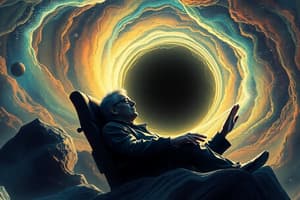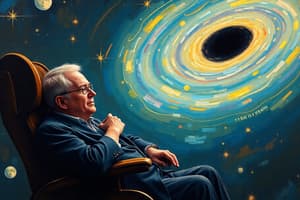Podcast
Questions and Answers
Which scientific concept is most closely associated with Stephen Hawking's research, beyond his work with black holes?
Which scientific concept is most closely associated with Stephen Hawking's research, beyond his work with black holes?
- Gravitational singularities (correct)
- Quantum entanglement
- Plate tectonics
- String theory
What specific event solidified Hawking's transition from academic physicist to a figure of mainstream cultural recognition?
What specific event solidified Hawking's transition from academic physicist to a figure of mainstream cultural recognition?
- His diagnosis with ALS
- His collaboration with Roger Penrose
- The publication of "A Brief History of Time" (correct)
- His receipt of the Lucasian Chair at Cambridge
What condition significantly impacted Stephen Hawking's ability to communicate?
What condition significantly impacted Stephen Hawking's ability to communicate?
- Cerebral Palsy
- Multiple Sclerosis
- Parkinson's Disease
- Amyotrophic Lateral Sclerosis (ALS) (correct)
In what specific area of physics did Hawking's research primarily concentrate?
In what specific area of physics did Hawking's research primarily concentrate?
What significant theoretical connection did Hawking propose regarding black holes and the universe?
What significant theoretical connection did Hawking propose regarding black holes and the universe?
Hawking's exploration of space-time and gravity primarily employed what approach?
Hawking's exploration of space-time and gravity primarily employed what approach?
What revolutionary idea did Hawking and Penrose prove together?
What revolutionary idea did Hawking and Penrose prove together?
What did Hawking theorize could create a singularity?
What did Hawking theorize could create a singularity?
What was the primary goal of Stephen Hawking's book, "A Brief History of Time"?
What was the primary goal of Stephen Hawking's book, "A Brief History of Time"?
Who held the Lucasian Chair of Mathematics at Cambridge before Stephen Hawking?
Who held the Lucasian Chair of Mathematics at Cambridge before Stephen Hawking?
Flashcards
Stephen Hawking
Stephen Hawking
Renowned theoretical physicist known for black hole research.
ALS Diagnosis
ALS Diagnosis
Stephen Hawking was diagnosed with Amyotrophic Lateral Sclerosis in 1963.
Black Holes
Black Holes
Regions in space where gravity is so strong that nothing can escape.
Gravitational Singularity
Gravitational Singularity
Signup and view all the flashcards
A Brief History of Time
A Brief History of Time
Signup and view all the flashcards
Lucasian Chair
Lucasian Chair
Signup and view all the flashcards
Theoretical Physics
Theoretical Physics
Signup and view all the flashcards
Mathematics in Physics
Mathematics in Physics
Signup and view all the flashcards
Quantum Cosmology
Quantum Cosmology
Signup and view all the flashcards
Hawking Radiation
Hawking Radiation
Signup and view all the flashcards
Study Notes
Stephen Hawking's Life and Work
- Hawking, a theoretical physicist, explored the nature of black holes and the universe's origins.
- He popularized complex scientific ideas for a wider audience.
- Born in Oxford, UK, in 1942, and grew up in St. Albans.
- Diagnosed with ALS in 1963, which confined him to a wheelchair.
- Continued his research and education, using a speech synthesizer.
- Used mathematical models to understand space-time, gravity, and humanity's place in the cosmos.
Black Holes
- Black holes are regions of spacetime with extremely strong gravitational pull.
- The term was coined in 1967, but theorized earlier.
- Their existence is possible according to general relativity.
- Black holes can form after the death and collapse of giant stars.
- Hawking explored the idea of singularities inside black holes.
Hawking's Research
- Hawking studied black holes and their potential connection to the beginning of the universe.
- He examined the work of Roger Penrose, focusing on the concept of a singularity.
- Proposed that black holes might emit heat and eventually evaporate, using quantum theory.
Hawking's Communication
- He wrote a popular science book titled "A Brief History of Time."
- This book explained complex scientific ideas to the general public.
- His work made complex concepts accessible to a wider readership.
- Achieving significant popular and critical success.
Studying That Suits You
Use AI to generate personalized quizzes and flashcards to suit your learning preferences.





